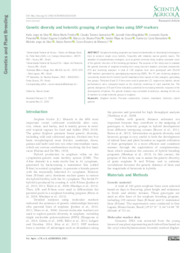Genetic diversity and heterotic grouping of sorghum lines using SNP markers.
Genetic diversity and heterotic grouping of sorghum lines using SNP markers.
Author(s): SILVA, K. J. da; PASTINA, M. M.; GUIMARÃES, C. T.; MAGALHAES, J. V. de; PIMENTEL, L. D.; SCHAFFERT, R. E.; PINTO, M. de O.; SOUZA, V. F. de; BERNARDINO, K. da C.; SILVA, M. J. da; BORÉM, A.; MENEZES, C. B. de
Summary: Sorghum breeding programs are based predominantly on developing homozygous lines to produce single cross hybrids, frequently with relatively narrow genetic bases. The adoption of complementary strategies, such as genetic diversity study, enables a broader vision of the genetic structure of the breeding germplasm. The purpose of this study was to evaluate the genetic diversity of sorghum breeding lines using structure analysis, principal components (PC) and clustering analyses. A total of 160 sorghum lines were genotyped with 29,649 SNP markers generated by genotyping-by-sequencing (GBS). The PC and clustering analyses consistently divided the R (restorer) and B (maintainer) lines based on their pedigree, generating four groups. Thirty-two B and 21 R lines were used to generate 121 single-cross hybrids, whose performances were compared based on the diversity clustering of each parental line. The genetic divergence of B and R lines indicated a potential for increasing heterotic response in the development of hybrids. The genetic distance was correlated to heterosis, allowing for the use of markers to create heterotic groups in sorghum.
Publication year: 2021
Types of publication: Journal article
Unit: Embrapa Maize & Sorghum
Observation
Some of Embrapa's publications are published as ePub files. To read them, use or download one of the following free software options to your computer or mobile device. Android: Google Play Books; IOS: iBooks; Windows and Linux: Calibre.
Access other publications
Access the Agricultural Research Database (BDPA) to consult Embrapa's full library collection and records.
Visit Embrapa Bookstore to purchase books and other publications sold by Embrapa.

